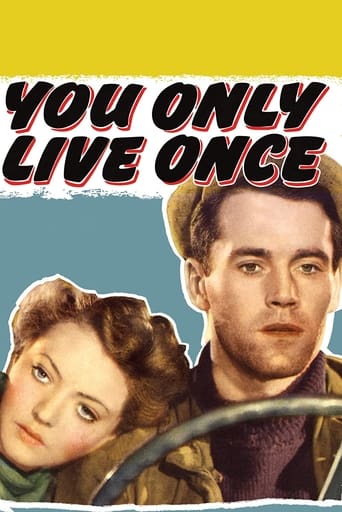Spikeopath
You Only Live Once is directed by Fritz Lang and written by C. Graham Baker and Gene Towne. It stars Sylvia Sidney, Henry Fonda, Barton MacLane, Jean Dixon and William Gargan. Music is by Alfred Newman and cinematography by Leon Shamroy. He has been pounding on the door of that execution chamber since the day he was born. One of Fritz Lang's first American productions is a cracker-jack proto- noir, a leading light (darkly shaded of course) in the sub-genre of fugitive lovers on the lam pictures. Story leans on the legend of Bonnie and Clyde and finds Fonda as three times jailbird Eddie Taylor. After strings are pulled and promises made, Eddie gets released into the arms of his adoring gal, Jo Graham (Sidney). Determined to go straight and settle down with Jo, Eddie finds a society not ready to forgive and forget, worst still, he's old comrades in criminal arms have cooked something up and it's not going to be good news for Eddie. Cue the Romeo & Juliet factor as two lovers love each other so much they will stop at nothing to be together and to try and make the other one happy. Lang brings his expressionistic bent to the tragi noir tale, drifting fogs, mists and spider web shadows across key scenes. Canted angles feature, reflections in a psychological eye also play their part, while the protection of animals theme – and the continuing frog motif - further strengthens the otherworldly – cum - nightmarish aura that so often permeated Lang's movies. The action scenes are deftly marshalled by the director, with a smoke grenade led robbery and a prison escape particularly worthy of luring you to the end of your seat. Lang also gets fine performances from his lead actors, Sidney is not done too many favours by the screenplay, where she is saddled with one of those compliant love interest roles, but she brings a quality to her scenes with Fonda that earns respect. Fonda is great in what is a two- fold role, shifting skilfully between a tender lover to an embittered man, he's a triumphant fulcrum for all the various strands that Lang is weaving together. It has been argued that it's a film that's too morally grey, but as film noir lovers will tell you, this is no bad thing, especially when Lang marries up his superb visuals with alienation, fatalism and pessimism. Historically important to film noir and Lang fans, You Only Live Once is an ambiguous gem. 9/10
jimakros
this is one those movies where you can go terribly wrong,because of the director and the stars.I mean,how bad can a movie be with Henry Fonda and Sylvia Sidney?.Well,it can be awful,when the story doesn't make any sense at all.Its just totally ridiculous from beginning to end.Fonda plays an ex-convict who does one stupid thing after another,and whose life is miserable beyond belief, because of some divine bad luck.There's no point going over the story,its hard to understand what this movie wants to say,seemingly that some people are born to be criminals and end up badly.Which is load of crap of course.I was so disappointed to see two wonderful stars in this horrible movie.
jc-osms
One of my very favourite films and further proof, if needed, that Fritz Lang did not leave his best work behind in Germany when he fled the Nazis for Hollywood in the early 30's. I could eulogise all day about the cinematography, but that would do a disservice to a strong narrative which seems to give a mild contemporary nod to the recently slain Bonnie and Clyde and some terrific acting especially by the two leads. There are so many shots to savour, I'll name just a few which caused me an admiring intake of breath;- for example the scene early in the film with a reflected image of the at that point still optimistic newly-weds sitting by the frog-pond, the expressionist use of shadows seemingly radiating out from Fonda's cell as he paces it in frustration and what may have been the first cinematic use of the three possible "Hold the front page" headlines in the press depending on the outcome of Fonda's trial plus of course the rightly famous eerie smoky set-piece where Fonda panics and shoots his friend the prison priest. Even simple framing shots (one of Sydney to camera looking into the runaway couple's car from Fonda's viewpoint, for example) are delivered with style and finesse, there's no question there's mastery at work here. The acting by Sydney and Fonda is great, passionate, completely in character and utterly convincing in conveying the depth of their relationship, crucial considering the incredible demands Fonda's character makes of the law-abiding Sydney. Who got the Oscars in their stead this year, I wonder? The bitter-sweet ending (the couple find release only in death) is absolutely right as is so much of this bravura Fritz Lang feature. Students of film noir can learn much from this dark and compelling work, all delivered in 86 engrossing minutes.
christopher-underwood
A bit over rated, this one, I think. It certainly takes a while to get going, is a bit sentimental and has plenty of plot holes. However, this is an early noir and being of lasting influence was certainly one of Mr Lang's traits.Some of the shots are as stunning as they are surprising and things are not overly explained, it's just that some stretches seem a little flat. Whilst I can see much of the early scenes are to make the later consequences more poignant but seventy years on these can appear ponderous.Take nothing away for the last twenty minutes or so, though, plus the superb and heavily ironic prison yard scene.




